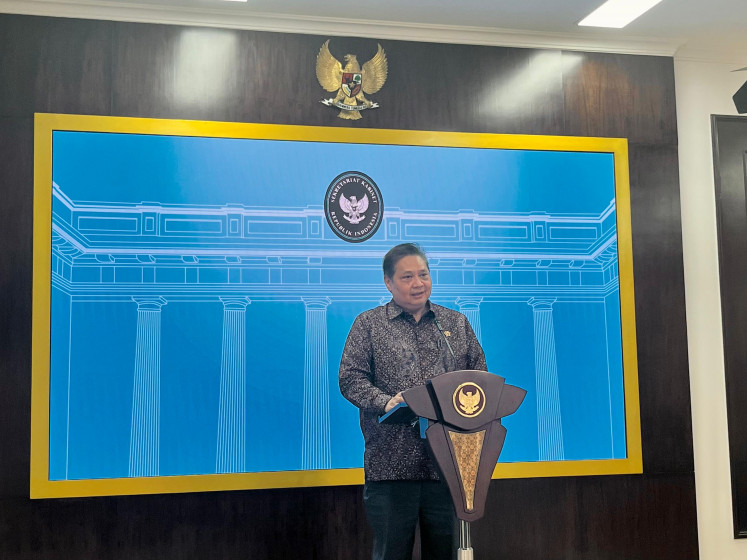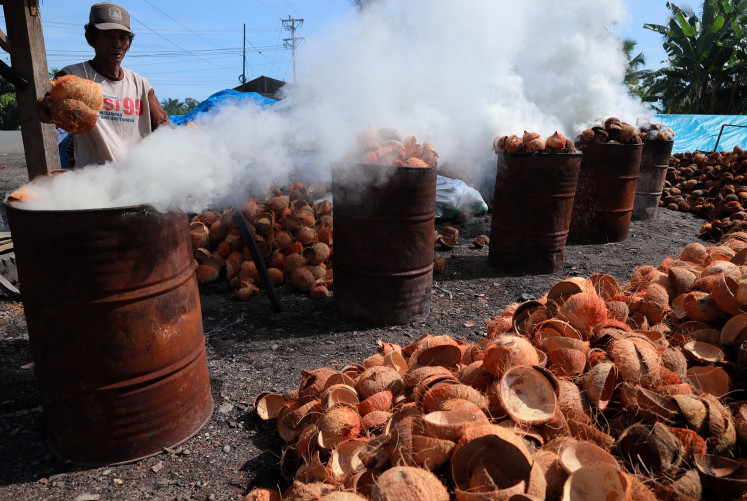The political enigma of Hamengkubuwono IX
Regarded as one of Indonesiaâs founding fathers, an important figure in both the Sukarno and Soeharto administrations and as the hereditary king of Yogyakarta, the late Sultan Hamengkubuwono IX has an ambiguous political legacy
Change text size
Gift Premium Articles
to Anyone

Regarded as one of Indonesia's founding fathers, an important figure in both the Sukarno and Soeharto administrations and as the hereditary king of Yogyakarta, the late Sultan Hamengkubuwono IX has an ambiguous political legacy.
One puzzle is why did the sultan, widely known as a (little-d) democrat, end his career as a deputy to a highly undemocratic president?
John Monfries, a former Australian diplomat, explores that puzzle, among several others, in his political biography of Hamengkubuwono IX titled A Prince in a Republic: The Life of Sultan Hamengku Buwono IX of Yogyakarta.
Studying Indonesia and the Indonesian language at university, Monfries began his fascination with Yogyakarta after meeting his wife, Isti, during a posting to Indonesia from 1969 to 1971. His wife's family was closely connected to Yogyakarta's royal family.
After 30 years in the foreign service, Monfries returned to academia, studying at the Australian National University and writing about the sultan for his dissertation, which forms the basis of the book.
Although the sultan played a notable role on the national stage from the Independence War to the early years of Suharto's New Order, no foreign scholars have researched him in depth.
'Hamengkubuwono IX, although so prominent in Indonesian politics for so long, has not yet attracted a full-length study in English,' Monfries wrote.
Born in 1912, Dorojatun ' the Sultan's name prior to his coronation ' was a son of Prince Haryo Puruboyo and Raden Ayu Kustilah. A rift between his parents led to her mother's banishment from the palace around 1918. At the age of 17, Dorojatun was sent to study in the Netherlands.
Less than a year after coming back to Indonesia, he ascended to the throne in 1940.
Described as a politically astute and a non-ideological pragmatist, the new sultan remained on reasonably good terms with the occupying Dutch and later the Japanese.
He quietly attempted to lessen the worst of the brutal Japanese occupation, including the Mataram canal project, and tried limit how many people the Japanese took from Yogyakarta as slave labor (romusha), albeit with mixed success.
However, the young Sultan stood out during the Independence era by siding with the nascent republic, a move that shocked the Dutch. His greatest triumph was during the Serangan Umum (General Offensive) in early 1949, when he coordinated with then-Lt. Col. Soeharto to attack Dutch posts in Yogyakarta.
During the Sukarno era, Hamengkubuwono IX, as defense minister, assembled an impressive team of military leaders and civilians to rationally organize and manage the armed forces.
'It was scattered bands all over the archipelago ' just popping out everywhere in 1945 ' and much more [loyal] to local royals. Impossible to control,' Monfries says.

The defense minister's reform plans were undermined by Sukarno, he adds. The president 'wanted a more revolutionary and dashing force, rather bureaucratic and technological force that Hamengkubuwono and administrators wanted.'
It was the sultan's biggest defeat and made his relationship with Sukarno become ambiguous.
For research, Monfries talked to notable figures ' such as the late Soedarpo Sastrosatomo, the journalist Rosihan Anwar and economist Radius Prawiro ' and also members of the sultan's inner circle, including his son and successor, Hamengkubuwono X.
Monfries also quotes extensive materials, ranging from war records in The Netherlands and unpublished observations by the late long-time Indonesia watcher Herb Feith.
One particular detail in the book that might create controversy is an allegation made by The Central Intelligence Agency (CIA) that sultan rejected a request from Soeharto, in the aftermath of the attempted coup in 1965, to set up a rival government in Bandung. No Indonesian source has ever confirmed it, according to Monfries.
Hamengku Buwono IX made a political comeback under Soeharto, chairing regular meetings of the Cabinet's economic ministers, assisting the Western-educated technocrats in building the nation's economy after the staggering debt and inflation that prevailed under the Old Order.
'After that Indonesia began a quite impressive recovery over the next decade or decades and Hamengkubuwono deserves some of the credit for that,' Monfires said.
Things again turned sour for the sultan during his tenure as vice president, when Soeharto used the sultan's position to give a public impression that the regime was an equal partnership of military and civilians.
'They cooperated well in 1948-1949 and when the sultan was the defense minister and Soeharto was posted in Makassar,' Monfries, 68, said at a recent discussion about his book in Jakarta.
'But during the New Order, that all changed. Soeharto became more powerful and arrogant. Their relationship grew tense and distant. And when Soeharto tried to take all the credit for the General Offensive for himself, the sultan was quite irritated.'
Considering Hamengkubuwono IX's position as a Javanese nobleman, how did Soeharto, who was also Javanese, speak to the sultan, considering the highly stratified forms of address in the Javanese language?
'A person who knew them said that there was usually a presence of a third person in their meetings, so they could speak Indonesia. Therefore, there was no issue about using inggil, kromo, madyo Javanese [middle to high Javanese language styles].'
Despite his defeat in reforming the military and his passivity in the Soeharto administration, Hamengkubuwono IX is remembered as a king who achieved great things in his life.
Hamengkubuwono IX used his status as sultan not only for the nation, but also to ensure his own political survival and, ultimately, to maintain Yogyakarta as a principality and a special region.
Asked whether he was satisfied with his book, Monfries was critical. 'I should've put in more about his last ten years, his activity with the Pramuka [the scout movement].'
Presenting the sultan as a political figure prompted both questions and criticism from some of sultan's admirers, for who Monfries had some advice.
'Hamengkubuwono X in a book discussion in Yogyakarta quoted his father, 'Don't idolize me',' Monfries said. 'As I mentioned before, he is the nation's hero but also a human.'









